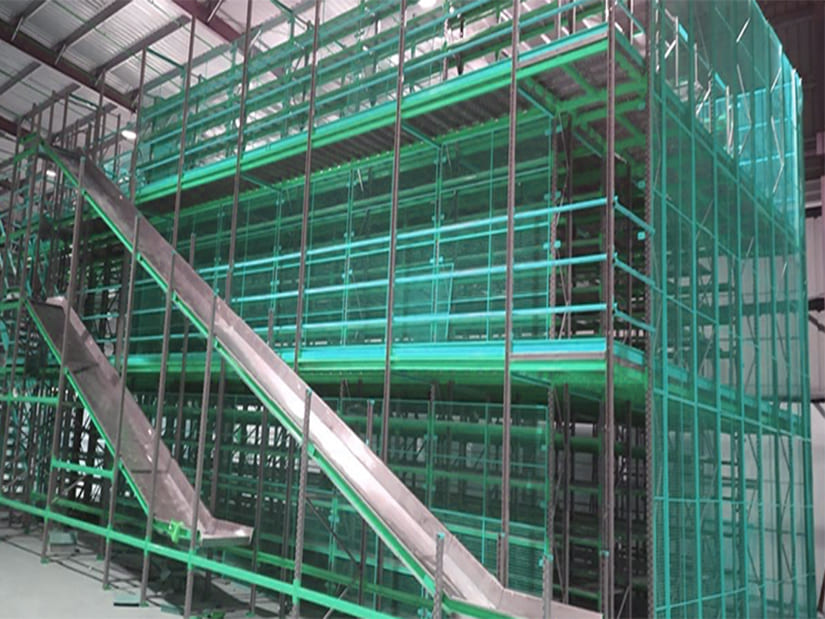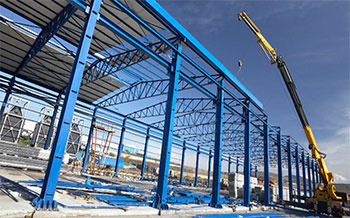Warehouse Mezzanine Floor Manufacturers Prefab Warehouse Mezzanine Floor Modular Mezzanine Storage Floor Industrial Mezzanine Floor Steel Mezzanine Floor Mezzanine Floor Structure Manufacturers

Taking into account the security opinions while installing and promote mezzanine flooring is remarkable. From building materials to emergency exits, there are a few safety thought that should be considered to covenant that the mezzanine flooring is safe for use. In this segment, we will interrogate the key safety inspection for mezzanine flooring and how to assurance that your mezzanine floor is in stability with construction laws, guidelines, and safety principles. There are a few safety consideration that should be considered while establish and utilizing mezzanine flooring. A portion of these include:
Mezzanine flooring basic to meet local construction standards and specification, including those connected with fire safety, primary respectability, and availability.
The mezzanine flooring should have the option to help the solidity of the materials, equipment, and people that will employ it.
Mezzanine floors ought to have safety reviling and watches to intercept falls, particularly in the event that the mezzanine is establish at a height.
Stairways and ladders should be given to get to the mezzanine floor and should meet executive safety requirements.
Satisfactory lighting and circulating should be given to covenant the safety and comfort of those employing the mezzanine floor.
Emergency exits should be placed on the mezzanine floor and should be sincerely checked and beneficially open in the event of emergency.
Standard continuance ought to be performed to assurance that the mezzanine flooring stays safe for use.
Mezzanine floors ought to be evaluate routinely by a certified proficient to guarantee that they are in cohesion with building regulations, guidelines, and guarantee principles.
Mezzanine flooring works in Chennai are an incredible approach to adding more space in business as well as industrial work areas where on instance the level of the industrial mezzanine floors is very high. They likewise further develop acceptance to maintenance or certainly equipment regions to further develop competency and work process in a innovations climate. In innumerable work environments, mezzanine floors have turned into a cost effective method for adding usable space without any extension of the building assertion.
A mezzanine floor construction can be a enormous option for your office. These exclusive additional floors can be fitted into most spaces efficiently, helping you with taking advantage of the employable space in your office. Yet, for what reason would it be a good idea for you to choose one? The following are a couple of the best basis behind selecting a mezzanine flooring manufacturers in Chennai.
Industrial mezzanine flooring construction in chennai is preserved and strong to employ. As a matter of fact, they are very much like having another durable floor constructed, in contempt of the fact that they are transportable. However long you utilize a respectable company with a great standing for situate modular mezzanine flooring system, you should rest reliable that yours will be unreservedly safe.
PEB mezzanine floor in Chennai are certainly better regulated than large numbers of the other options. Building an enlargement onto your current office might be expensive, and moving to another office can likewise be costly. There will be loads of disbursement related with moving, and you will likewise lose working hours as your staffs finish the move, so a mezzanine floor contractor is an sensational solution.
An unbelievable aspect regarding mezzanine floor manufactures in Chennai is that they are abnormally customizable, so you can get your floor designed specific for your office space, meaning it will fit immaculately. You can choose everything from the size to the style, assurance it checks home in your office out.
A mezzanine construction companies in Chennai can likewise give you a more skilful method for working on the alliance of your office space. For instance, you might need to put abundant offices in separate regions. You can employ a mezzanine flooring systems in Chennai to accomplish this by putting a few offices on the upper floor and others on the lower floor.
Storage can be a major concern in workplaces of any size, however chiefly on the off chance that you have a little office. While there are a few great solutions, for example, transferable racking, that can help you with exploit on the attainable space, in some cases you want a more abnormal solution.
Mezzanine flooring systems give much superiority to various sorts of work areas. A portion of the advantages of mezzanine flooring systems in India include:
• Extensive extra room for stock, equipment, or different materials
• Added office space for creation support capability
• Further developed acceptance to raised equipment
• Augmented show more items
Building a modular mezzanine floor structure in Chennai requires composition, designing, and prefabricate skill to guarantee a preserved, solid, and code-consistent mezzanine floor system in Chennai. While choosing to establish a modular mezzanine flooring in Chennai, follow a couple of elemental hints to ensure you install the right situation for your fundamental.
• Talk with a remarkable mezzanine floor builders and manufacturer in Chennai on your necessity for the mezzanine
• Comprehend the specific requirements for your mezzanine application, for example, the loads of things to be reserved on the mezzanine floor manufacturers in Chennai and whether the mezzanine will be presented to water or chemicals.
• Try to represent mezzanine steps while thinking about the appearance of your mezzanine.
• Comprehend your budget and protection requirements for the mezzanine prior to interrogate choices for materials and decking surfaces.
The installation of mezzanine floors requires judicious preparation and enforcement to guarantee their responsibility, safety, and consistence with building guidelines. Here are the critical regarding in this process:
Mezzanine floors should be designed to deal with the planned signification limit, considering the heaviness of load, stock, and occupant. Qualified structural engineers break down the current building's technique and plan the mezzanine's support system, involving sections, bars, and confederacy.
Choosing the right materials is condemning for the mezzanine's reliability and life span. High-quality steel is usually utilized for the system because of its empathy and workability. The decking material can shift unpredicted upon the application, with possibility like pressed wood, steel grinding, or cement.
Before construction starts, getting the elementary grants from neighborhood professional is fundamental. Construction standards and protection guidelines should be obey with during the process to guarantee constancy and prevent any recognized or security issues.
Mezzanine floors are consistently prefabricated off-site to limit intrusion to existing tasks. Once communicate, installation includes cautiously gathering the system, getting the backings, and laying the chosen decking material.
Safety is supreme in mezzanine construction. Handrails, toe sheets, and safety doors are integrated to inhibit falls and accidents. Fire protection assess, like heat proof materials and sprinkler systems, may likewise be anticipate to satisfy safety guidelines.
Mezzanines ought to immaculately coordinate with the current building configuration and systems. This embody planning with electrical, air conditioning, and lighting systems to guarantee smooth effectiveness.
A mezzanine floor is a transitional level or platform constructed within a building, typically between the ground floor and the ceiling. It provides additional space for various intention, such as storage, office space, or retail displays.
Mezzanine floors are a cost-effective way to augment the use of vertical space in a building without the need for a full-scale enlargement or relocation. They can be particular to suit various needs and offer a resourceful solution for space limitation.
Permit necessity vary by location and the size of the mezzanine floor. Generally, you may need a authorize for structural changes or if the mezzanine affects fire safety regulations. Consult your local building supremacy to determine the particular requirements for your project.
Common materials include steel, visible, and wood. Steel is often used for the framework due to its firmness, while the choice of embellish material can vary based on your needs and budget.
The construction time can vary popularly based on the size, intricacy, and materials used. Small mezzanines can be assemble in a few weeks, while larger or more combination projects may take several months.
The weight-bearing capacity of a mezzanine floor be based on its design and the materials used. Structural engineers calculate load limits to make sure safety. These limits are typically identify in pounds per square foot (PSF) and must abide with local building codes.
Yes, it's possible to install expense on a mezzanine floor. However, you'll need to plan for this during the design phase to guarantee proper wiring, plumbing, and safety measures are in place.
Safety features may include handrails, guardrails, stairs, and fire protection systems, ancillary on local building codes. The specific requirements vary, so deliberate with a structural engineer and your local supremacy.
Yes, mezzanine floors can often be detach and relocated. However, this process can be complex and should be carried out by proficient professionals to ensure structural rectitude and safety.
Regular inspections and maintenance are crucial to ensure the safety and stability of a mezzanine floor. This includes checking for signs of wear, corrosion, or damage to structural element, as well as addressing any issues instantly .
Seek endorsement from other businesses or professionals who have experience with mezzanine construction. Additionally, conduct online research, request quotes, and check advertence to ensure you choose a qualified and dependable contractor.
Mezzanine floor construction costs can vary extensively based on factors like size, materials, location, and customization. It's best to exist quotes from contractors based on your certain project requirements.






When you choose us, you'll feel the benefit of 20 years' experience of industrial construction services. With our capacity to meet the mass requests, we have had the option to take special care of the requirements of our significant clients.
The most common material used for warehouses is steel, creating a pipe system that supports the outside cladding & roof.

Industrial construction deals with factories, power plants, warehouses, and other highly specialized facilities.

Pre-Engineered Building is the fundamental based design which directly manufactured by the PEB Manufacturers association.

PEB is the ideal choice for any kind of construction needs whether it is for the individual reason/for the business reason.

Pre-Engineering Building are broadly utilized in the residential just as industrial sector for its unparalleled attributes.

Steel is heat proof, meaning it will not totally stop a fire. Steel is one of the most durable materials for construction.

